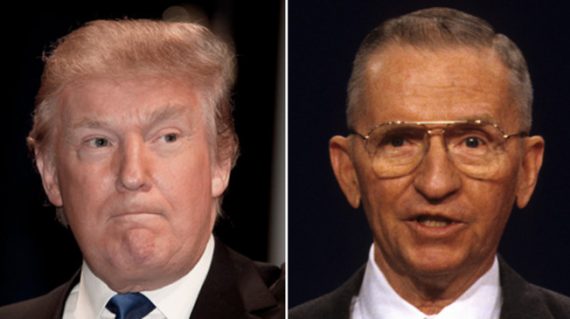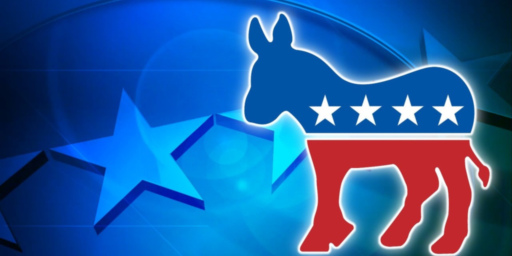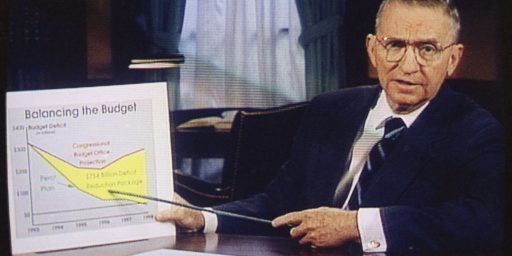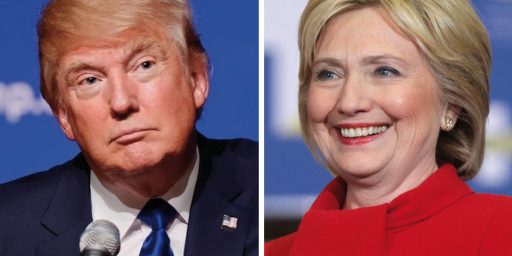Trump as Perot 2.0
In 1992, an eccentric billionaire ran an independent campaign against a Bush and a Clinton. It could happen again.
Bill Scher argues that “Republicans Shouldn’t Fear a Third-Party Trump.”
Today, Trump looks like a populism-spouting insurgent with the potential to split the party, giving Republicans cause to keep him in the fold. But that’s because for the moment, he’s running in a Republican primary, solely focused on conservative base voters.
Running as an independent, Trump’s calculus changes. He would then want to pick off votes wherever he could find them, regardless of party affiliation or ideological bent. He would look more like the last billionaire populist to pursue the White House: Ross Perot.
Unlike Trump, Perot bypassed the primaries and never had to target his appeals to the far right. Yet similarities already exist between the two.
Both put a premium on rebuilding American infrastructure, an issue with bipartisan appeal but which particularly animates Democrats. Trump’s only video ad – uploaded to YouTube before he officially announced – stresses two issues: infrastructure and immigration, and infrastructure comes first. “The infrastructure of our country is a laughingstock all over the world,” Trump laments. “Our airports, our bridges, our roadways – it’s falling apart.”
Perot, while primarily focused on balancing the budget in five years, made sure to include $40 billion in new money for infrastructure, along with $69 billion more for research and development, aid to cities and education. “All of that will stimulate jobs,” said Perot, offering a splash of Keynes with his austerity pitch.
There is also overlap on trade, another issue that transcends party lines. Trump has called the pending Trans-Pacific Partnership a “disaster” because “we don’t have our best and our brightest negotiating for us.” Perot said during the 1992 debates that the pending NAFTA agreement would create a “giant sucking sound going south” and pledged as president to “study that 2,000-page agreement and make sure it’s a two-way street.”
Both used their business success to push an anti-Washington message. Trump brags about his wealth and proclaims he is superior to “all-talk, no-action politicians.” Perot batted back questions about his experience by saying, “I don’t have any experience in gridlock government.”
Both represent a jumble of ideologies. Perot proposed a 10 percent across-the-board spending cut to most federal programs, including anti-poverty initiatives. But he also backed higher taxes on the wealthy and said, “Trickle down economics didn’t trickle at all, folks.” He opposed letting gays serve in the military but he was pro-choice on abortion. He was known for his efforts on behalf of prisoners of war, but he opposed the first Iraq War.
An exploration of Trump’s previous political beliefs or myriad party affiliations and alliances over the years will make your head spin: He’s endorsed a massive surtax on the rich, but now wants the top income tax rate cut in half. He’s praised single-payer health care but attacks Obamacare. He was a Republican, then an independent, then a Democrat, then a Republican. In the middle of that faith journey he ran for president on the Reform Party ticket. Also, like Perot, he opposed the second Iraq War.
The parallels Scher points to are striking. In particular, I’d forgotten that Trump had run for the nomination of the Perot-founded Reform Party in 2000, losing to Pat Buchanan.
While I never seriously considered voting for him, I liked Perot quite a bit in 1992 for a lot of the same reasons that people like Trump today. Politicians have to measure their words in a way that eccentric billionaires don’t and there’s something refreshing about straight talk. By 1996, I’d long tired of Perot’s shtick but I nonetheless found him fascinating for some time. I’ve thought of Trump as a clown for as long as I can remember, but maybe the 26-year-old me would have liked him.
Scher notes that, while Trump takes more votes away from the GOP than the Dems in early polling, it’s not as stark as you’d think:
This decade’s billionaire populist is taking 23 percent in a hypothetical three-way race against this decade’s Bush and Clinton. Trump’s presence drove Jeb’s numbers from an RCP average of 43 percent in head-to-head matchups with Clinton down to 23 percent as well.
However, Republican should note that Trump does not leave Hillary unscathed. She drops from 46 percent to 37 percent. True, Jeb is the bigger loser, for now. But we’re only testing the effect of the Republican primary version of Trump. And even that version lops nearly 10 points off of the Democrat. The independent general election model would attract a different mix of voters.
As to the 1992 race, Scher gives a fair recap of the impact Perot had:
Debate continues to rage whether Perot cost George H.W. Bush his re-election or if the sour economy would have handed it to Bill Clinton anyway. There are two schools of thought.
One is quantitative, recently reiterated by MSNBC’s Steve Kornacki. The 1992 exit poll asked Perot voters who was their “second choice.” They split evenly between Clinton and Bush, 38 percent for each. (State exit polls indicate that Perot may have tipped the tight races in Georgia, New Hampshire and Ohio to Clinton, not enough to change the Electoral College outcome.) Kornacki also notes that spring polls showed Perot “splitting the anti-Bush vote and cutting deeply into what should have been Clinton’s base.” When Perot was out of the picture in the summer, Clinton was beating Bush handily in two-way trial heats.
The counter-argument is qualitative: Perot saved the bulk of his animus for Bush and his record, softening him up for Clinton.
History professor Julian Zelizer just recapped that case for CNN: “Perot’s onslaught against Bush … damaged the image the entire American electorate had of his job as president, all of which benefited Bill Clinton …” During the Democratic convention in July, Perot said he was dropping out in part because “the Democratic Party has revitalized itself.” The move helped give Clinton a record “convention bounce”of 16 points in the Gallup poll and a lead he never relinquished.
Not surprisingly, the second narrative was my own sense of the impact in real time. As a substantially more hardline Republican in those days, I was somewhat disillusioned with the elder Bush (who I actively campaigned for during the 1988 primaries and have since come to admire as perhaps the best man to hold the presidency in my lifetime). Buchanan’s attacks on him during the 1992 primaries hurt, as did Buchanan’s “religious war” convention speech. But I remain convinced that there was simply no way that the electorate would have gone from the landslide of 1988, where Bush won by a ten point margin, carrying 40 states and 426 electors to a draft-dodging, dope-smoking, serial adulterer without Perot’s entry into the race. As a Naval Academy grad, self-made billionaire, and minor folk hero after financing a rescue of his employees from Iran, he had the standing to attack Bush that Clinton lacked. When Perot withdrew from the race, essentially endorsing Clinton, it became easier for moderates to make that leap. There’s no way to run the counterfactual, of course.
I’m too detached from the zeitgeist these days to understand Trump’s appeal. He just strikes me as an ignoramus and a bully. Still, his brand of populism would naturally seem to draw more votes from the Republican fringe—especially one disillusioned by yet another moderate if Jeb Bush or John Kasich were the nominee—than from the Democrat center.
Regardless, I’d very much like to see Bush, Kasich, and other serious Republicans take a strong stand against Trump as we get into the debates. If the GOP is going to be a serious national party again, it’s got to stop alienating the center. Trump is great entertainment for the lowbrow set but he’s poison for a political party trying to win back broad appeal.






Really? Because I would estimate that was about 15% about Clinton charming the electorate and 85% Bush being completely clueless. Perot may have helped by pointing out some of Bush’s errors that Clinton wouldn’t have gone after aggressively, but the difference between 1988 and 1992 was A) a bad economy B) The Iraq conflict ending too early for Bush to maintain his war bump and C) Bush looking and acting like Gerald Ford 2.0 (now with less empathy and more money).
As to the main thrust, there’s not way Trump is able to pivot towards the center, he’s gone full RWNJ, you don’t come back from that to pull Dem votes (with the exception of those Dems who always seem to vote for the GOP – the Mickey Kaus squad)…
I seem to recall it a bit differently. By November it was obvious that Perot was a looney-toon. He’d already done the whole the CIA will destroy my daughter’s wedding thing. He’d gotten out of the race supposedly over that, then got back in for no apparent reason. Most of the country were embarrassed for Admiral Stockdale and blamed Perot for putting Stockdale in that position. Appointing Stockdale as VP certainly called into question Perot’s claimed management abilities.
The deficit, the crazy uncle in the attic who we were ignoring but was going to come down some day and beat us all to death with pie charts if we didn’t panic and take drastic measures, wasn’t AN issue, it was Perot’s whole campaign . (For the younger audience, you had to be there.) Remember what happened? We elected Bill Clinton, who did nothing drastic. A little tax increase here, a little spending cut there, allow the economy to grow, and pretty soon we’ve got a surplus. There’s an example for our present circumstances there.
Crusty’s right. Bush the First made three mistakes. He sensibly raised taxes, alienating his base; he did little or nothing about the recession; and he fought his war too early in his term.
The problem becomes how to make Trump run third-party. My read of the situation is Trump, a shameless realtor, is willing to say most anything to maintain his suction. The integrity of the party he’s running to receive the nomination of doesn’t concern him. Attacking him made Trump threaten a third-party run, but I give Trump enough credit in his rabble-rousing to think it’s a trap. He can lay out disturbing truths about the candidates the base has probably forgotten or ignored, like his tweet about the Koch conference, and cast them in lights no Democrat making such accusations would be given the time of day to shine.
Are we positive Trump isn’t a plant Debbie Wasserman Schultz came up with? She represents a Florida district, this could be a crazy idea of her’s no sensible person interdicted against.
As a partisan Dem, I agree but then the center*** isn’t paying any attention right now anyway.
*** count me as among those who have very little belief in an actual persuadable center. the center exists, but they tend to vote the way they’ve always voted, be it Dem or GOP.
Trump will flash out long before any actual votes are cast…including primaries.
@gVOR08:
I was a bit young, but these are the things I remember as well. But I knew smart Democrats who still voted for him.
@OzarkHillbilly: There are far fewer swing voters than people who identity as “Independent” in the polls. Yes, most people are reliable “leaners.” But there’s obviously a big jump in both directionality and turnout from election to election, depending on the current state of the economy, the candidates’ personalities and backgrounds, and various idiosyncratic issues. In this election, in particular, there are going to be a lot of people who aren’t hardcore Republicans and yet can’t stand Hillary Clinton. But they’re not going to vote for a party they perceive Donald Trump as representing.
I am as optimistic about Mr Trump’s independent campaign as the next Dem. But I have my doubts about the Scher article for the simple reason that no specific Repub candidate is named. If Jeb! is the nominee and Mr Trump does run vigorously, my reading of the situation is that the R-party would take a YOOOGE! shellacking.
Read years ago an analysis of the effect of the George Wallace campaigns that illuminated the effect of ‘3d parties’ on American electoral politics. The short version is that a ‘3d party’ is a stepping stone on the road to a significant demographic leaving one party and switching to another. So Gov Wallace was a necessary figure in the transition of the old ‘solid south’ from Dixiecrats to Repubs. Applying that scheme, I’m thinking that a Trump ‘3d party’ is a transition-point for Hispanic voters to become as committed to Dems as Blacks and Jews are and that the hard-right, anti-immigrant block would consider a Jeb! candidacy as a very strong slap in the face. They would then become a much looser part of the Repub coalition than they now are. The R’s would have a lot of work to do on their own core supporters instead of trying to grow their party. Or alternatively, (calling S/Destroyer) the various constituencies in the R-party would fall on each other in a death match over the remains.
Popcorn!
Bonus observation: The Trump campaign has trademarked the words ‘trumpocrat’ and ‘trumpublican’.
The Flying Spaghetti Monster doesn’t love me enough to give us a third party run of Trump/Palin. It would be a fabulous real time train wreck, giving us an election result of Hillary at 50%, Jeb! at 25% and Trump at 25%. Hillary could conceivably top 500 EV in that scenario!
But I’m sure the heads of the Republican Party (ie: Koch brothers, Sheldon Adelson, Foster Fries) will prevent that from happening.
@CrustyDem: “As to the main thrust, there’s not way Trump is able to pivot towards the center, he’s gone full RWNJ, you don’t come back from that to pull Dem votes (with the exception of those Dems who always seem to vote for the GOP – the Mickey Kaus squad)…”
And the big problem for the GOP is that if Trump pulls (say) 5% of the GOP vote, that can shift a state or two or three…..
Did anyone read the recent polls about Latinos and their opinions of Trump?
Mr. “Latinos love me” is driving them by the footballfield-load into the arms of the Democratic Party.
@JohnMcC:
@grumpy realist: Hmmm, they filed for an Express Abandonment on that one–wonder why?
Unless TRUMP FOR PRESIDENT, LLC is totally independent from Trump’s own organization and they got a S&D letter.
(For the curious, the address of the above organization is 6000 Cortaderia St NE #5204 Albuquerque NM 82111 and the email address is misc at 501c3GO dot com which sounds awfully generic. Methinks grifter grifter grifter.)
@JohnMcC: and on the other side:
Same grifters. Same express abandonment.
James: The GOP may never be a serious political party again because I don’t see it as capable of not alienating its part of the center. I may be wrong, and I think that something will rise up from the ashes, but the GOP does not seem to have the ability to isolate its radical element in the way that the Dems had done it by the time Clinton arrived on the scene.
@gVOR08: I was there–I even voted for him in ’92 (“smoked but didn’t inhale” alienated me and I didn’t see Bush as competent to continue). The part that I remember differently from what you may recall is that in exit polling some 24% of the voters polled indicated that they would have voted for Perot if they had believed a third-party candidate could win. Ironically enough, we missed out on (or dodged the bullet on) a Perot presidency because “third party candidates can’t win.”
@grumpy realist: Thank you for checking. I was going with a couple of media reports from sources that could obviously use your skills/diligence/curiosity.
I know I’m not the target Trump voter, but I’m missing how he’s appealing to GOP primary voters. I’ve heard he’s addressing and speaking to issues that other candidates are ignoring, or won’t address, but what exactly? I’m failing to see how Trump differentiates himself from other candidates on actual issues, rather than tone. (And if it’s just tone, then WTF.)
@Just ‘nutha ig’rant cracker:
The Dems never set up a large, profitable industry around stoking their radical elements. I don’t believe any element of the Democratic establishment funded and nurtured their radicals the way the Koch Bros set up the Tea Party. Did anyone from the establishment give significant funding to, say, SDS? This is because the Democrats didn’t depend on large numbers of radicals voting against interest the way the Reps depend on the Tea Party types.
The Republicans can’t govern as long as they depend on the TP types, and they can’t get elected if they don’t.
@James Joyner: I think Hillary is a perfect example of what I am talking about. People either love her or loathe her and will vote on that emotion. Than you have the partisan Dems and Republicans who would rather cut their arms off with a dull rusty machete than vote for or against a person of the opposing party. There are very few people out there who can be persuaded one way or the other. As to
I think it comes down to motivating one’s base. If Dems ever figure out how to reliably get their voters out, the GOP is in real trouble.
@JohnMcC: The existence of an Express Abandonment in both of these cases makes me highly suspicious that this was an attempt by a grifter to make money off the Trump name and he backed off when receiving a stiff letter of protest by one of Trump’s attorney. That’s about the only thing Express Abandonments are good for when it comes to trademarks–to send an official message to another party squabbling with you.
@David M:
It’s something subculturally* primal, not a rational thing although it can be justified. We experience it here from time to time in the comments. Donald Trump is speaking Truth™. The primary cesspool** that identifies with him sees his ramblings through a truthy lens, not one bound by realism or “ideology” per se. That’s partly what makes him dangerous inside the Republican fold.
* And I’d argue basic to human nature in general, but magnified in this instance by contemporary media.
** “Cesspool” is the nonpartisan
folk-wordcolloquialism for a group of political activists/primary voters, like a murder of crows or a pride of lions or a lawn of gnomes.@Tillman: A tackiness of candidates?
@grumpy realist: Who do I get my T-shirts and lawn signs from?
This pattern of not paying attention to numbers, as you do by discounting the exit polls, or Bush Sr.’s approvals in 1992, which were similar to Jimmy Carter’s in 1980, is no different than “I am not a scientist. Even before Perot entered the 1992, Bush Sr.’s approvals were on a steady downtrend and barely 40%. In 2004 and 2012, actual close re-election campaigns, W. and Obama at least held in the 45-49% range, hence the tossup.
Also, notice how CA, IL, MI, MD, DE, CT, VT, ME, PA, NJ, NH and NM, which all voted GOP 4 for 6 before Clinton, most 6 for 6, have all voted Dem in every election since 1992 (except NH/NM, 5 for 6), in races with and without Perot? Also, Perot was not a conservative. Look at his stances on the issues. Reagan’s retro-approvals in 1992, when the election was a referendum on Reagan-Bush, were very mixed, even after two landslide elections.
The case that Perot cost Bush is numerically, statistically, and factually bankrupt.
@JohnMcC: Well, either an organization expressly formed by the Holy Donald Trump himself to create political chotkes, or an independent organization that went to the Holy Donald Trump and obtained his benediction and holy blessing upon The Holy Production Of the Bless-ed T-Shirt and Sac-red Shot Glass. (sorry, can’t figure out how to do the accents.)
@Franklin:
I was 15 years old, and it was actually the first election I paid any attention to. I admit I had no interest in the substance of the election; I viewed it more as entertainment. And believe me, that election provided plenty of entertainment.
I actually was impressed by Perot at first, with his charts and his fiscal talk, and I was a little lacking in enthusiasm for Clinton, whom I was supposed to like because my family were all Democrats. That began to change when he decided to drop out of the race. I remember watching the press conference the day before he dropped out, and while I know people throw around the word “crazy” a lot when it comes to politicians, it really did look to me like he was a having an actual, honest-to-God nervous breakdown right there on camera. I don’t believe I’ve ever seen anything quite like it again. Whatever else you can say about the variety of presidents this country has seen, I think all of them had at least some basic ability to handle the immense pressure of the job without totally cracking up.
Perot, nevertheless, ended up getting 19% of the popular vote, the highest for a third-party candidate since Teddy Roosevelt in 1912. What if he hadn’t gone off the deep end and temporarily dropped out? He wouldn’t have won the election, but he almost certainly would have done substantially better than he did.
On the surface, I can see some of the similarities between Perot and Trump. Perot had a certain clownish quality, with his short stature, enormous ears, and squeaky voice. I always imagined that Joe Pesci would have been perfect to play him in a movie. As it turns out, there was a movie about Perot from years earlier called Wings of Eagles about the rescue of hostages during the Iranian Revolution. Perot was played by tall, ruggedly handsome Richard Crenna and depicted as a borderline action hero. Seeing this movie in 1992, as I watched Crenna answer a phone and say “My name is H. Ross Perot,” I found myself laughing hysterically. It was like that scene in Pee Wee’s Big Adventure where Pee Wee’s adventures are adapted into a movie-within-the-movie and he’s played by James Brolin.
For the most part, Perot’s basic policy platform was not in any way off-the-wall. In fact, it wasn’t substantially different from Clinton’s views on the deficit which he ended up using in his 1993 budget bill. Perot never supported Clinton’s bill, however. By the late ’90s, after Clinton oversaw the first balanced budgets in over 30 years, Perot was comparing Clinton to Hitler. In 2004, he endorsed George W. Bush, the man who destroyed the Clinton surpluses through the same type of failed policies that Perot had been running against back in 1992.
Perot is, in short, a funny man who actually did run a serious campaign back in 1992, something I don’t think Trump would be capable of doing if he wanted to, which he clearly doesn’t. It’s easy to make the comparison in hindsight, but Perot did not seem Trump-like at the beginning, and it is not at all difficult to imagine why many Democrats were drawn to his campaign in a way that virtually everyone but the far right is repulsed by Trump’s.
@gVOR08: Well, that IS a problem, all right. The ability to recognize that something doesn’t work is crucial in politics and the GOP and its sponsors seem not to see this (or are working on another agenda altogether).
@Tillman:
“Not bound by realism” is a critical part of this. It really isn’t that hard to poll well if you’re not remotely tethered to the real world. A candidate claims you’re right about everything that is wrong with the country and the solutions are simply a matter of the right guy fixing things.
What’s not to love.
Not really. I see no evidence that Trump has either political beliefs or party affiliations — or, if he does, they’re so personal as to be nonexistent.
Trump is about promoting Trump. Everything he says or does is consistent with that interpretation, and anyone who reads something into it beyond that has been conned. What surprises me is that people who would not respond to the Nigerian Bank Manager email do respond to Trump, every freakin’ day.
@DrDaveT: “What surprises me is that people who would not respond to the Nigerian Bank Manager email do respond to Trump, every freakin’ day.”
Actually, I’d guess the bulk of his support comes from people who DO respond to the Nigerian bank managers…